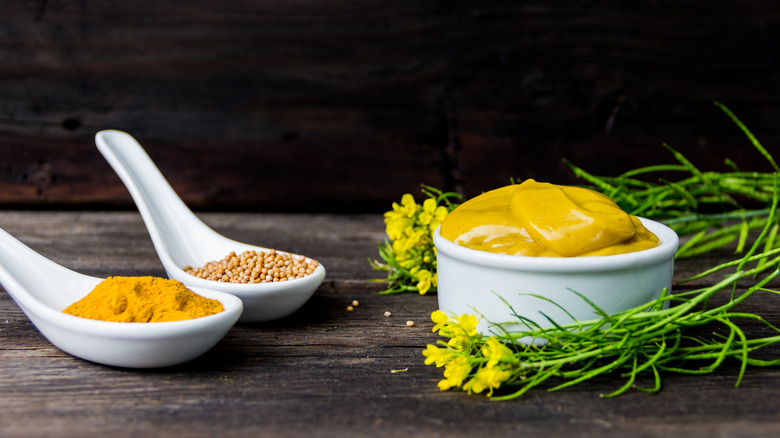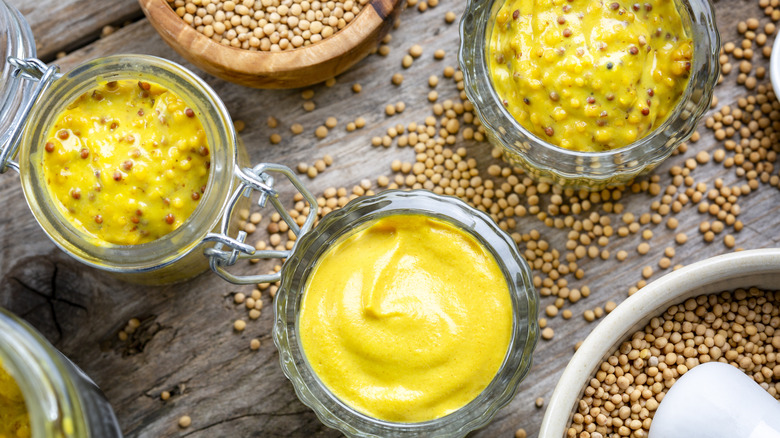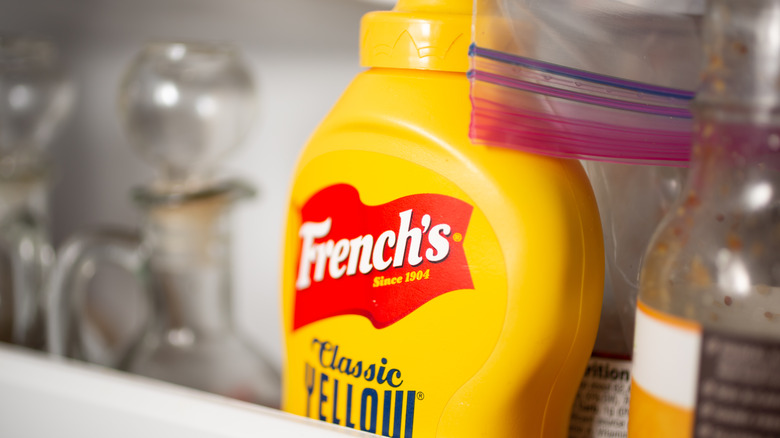Should You Store Mustard In The Fridge Or Pantry?
If you store mustard in the refrigerator but have noticed that it tends to sit out on the counter in restaurants, then you may wonder: Does it actually need to be kept in the fridge, or can it just go in the pantry? If it's unopened, then it's totally fine to store mustard in the pantry since it's a shelf-stable product. Just make sure to keep it away from direct sunlight, and at a cool temperature — if not in the pantry, then in a cabinet, where it should last for a year or two after being purchased.
Mustard's main ingredients are mustard seeds, spices, water, and vinegar, which makes it a high-acid condiment. This means it has a longer shelf life than lower-acidity creamy dressings. Even once it's been opened, it's still not strictly necessary to keep mustard refrigerated. "There are no ingredients in mustard that spoil," according to the French's website. And the USDA's Foodkeeper app agrees that mustard is safe to consume at room temperature after it's been opened.
However, you may prefer to store the condiment in the fridge to keep it tasting better for longer. This is especially true for different types of mustard. French's recommends that Dijon and horseradish mustard should both be kept refrigerated after opening, for example, since their flavors will be better preserved this way.
Refrigerating mustard helps retain flavor and color
While mustard won't go bad if it's stored in the pantry after opening, it will lose its flavor, color, and heat. You'll get more of a kick from the condiment by keeping it cold. With a mustard like Dijon, which has a very distinctive flavor profile thanks to ingredients such as white wine and tart verjus (or verjuice, which is unripened grape juice), you can preserve that great taste for longer if it's refrigerated. This means you'll get the best results whether you're using it in a sandwich or as a key ingredient for next-level béchamel sauce.
Flavor isn't the only thing that refrigeration helps with, either. With varieties such as hot English mustard, the yellow color will also stay more vibrant in the fridge. So while it can be stored in the pantry, you may prefer to keep it refrigerated to prevent color changes — which can occur at warmer temperatures — as well as keep it tasting punchier.
Flavorful honey mustard and whole grain mustard also last better when refrigerated. And if your mustard contains additional ingredients such as vegetables or fruit, then you'll definitely want to keep it in the fridge once opened. But if it's a condiment you're using very frequently, such as a mellower yellow mustard, then you may find that refrigeration isn't necessary and that the pantry does the job just fine. Plus, you may simply prefer to consume it at room temperature rather than fridge-cold.
How long mustard keeps in the fridge
Mustard will keep in the fridge for up to a year according to the USDA. Keep an eye on the sell-by and use-by dates – though since it doesn't go bad as such, you may find that the condiment lasts two or three months longer than the date stamped on the bottle. But keep in mind that it will taste less fresh the longer it's kept. So if you've had mustard for more than a year in the fridge, you may wish to discard it and buy a new one — perhaps in a smaller container if you're not using it regularly.
To avoid any food storage mistakes when refrigerating mustard, make sure the jar or bottle is tightly sealed, so that air cannot get in and cause oxidation. And be careful not to cross-contaminate the condiment with other types of food. Use clean utensils to serve mustard, and don't dip food directly into the jar.
If you're using dried powdered mustard — which is Ina Garten's secret ingredient for smash burgers — or mustard seeds, then they can both be stored in a dry and dark place, such as the pantry. Dry mustard will last for around six months whereas mustard seeds should be good for a year.



